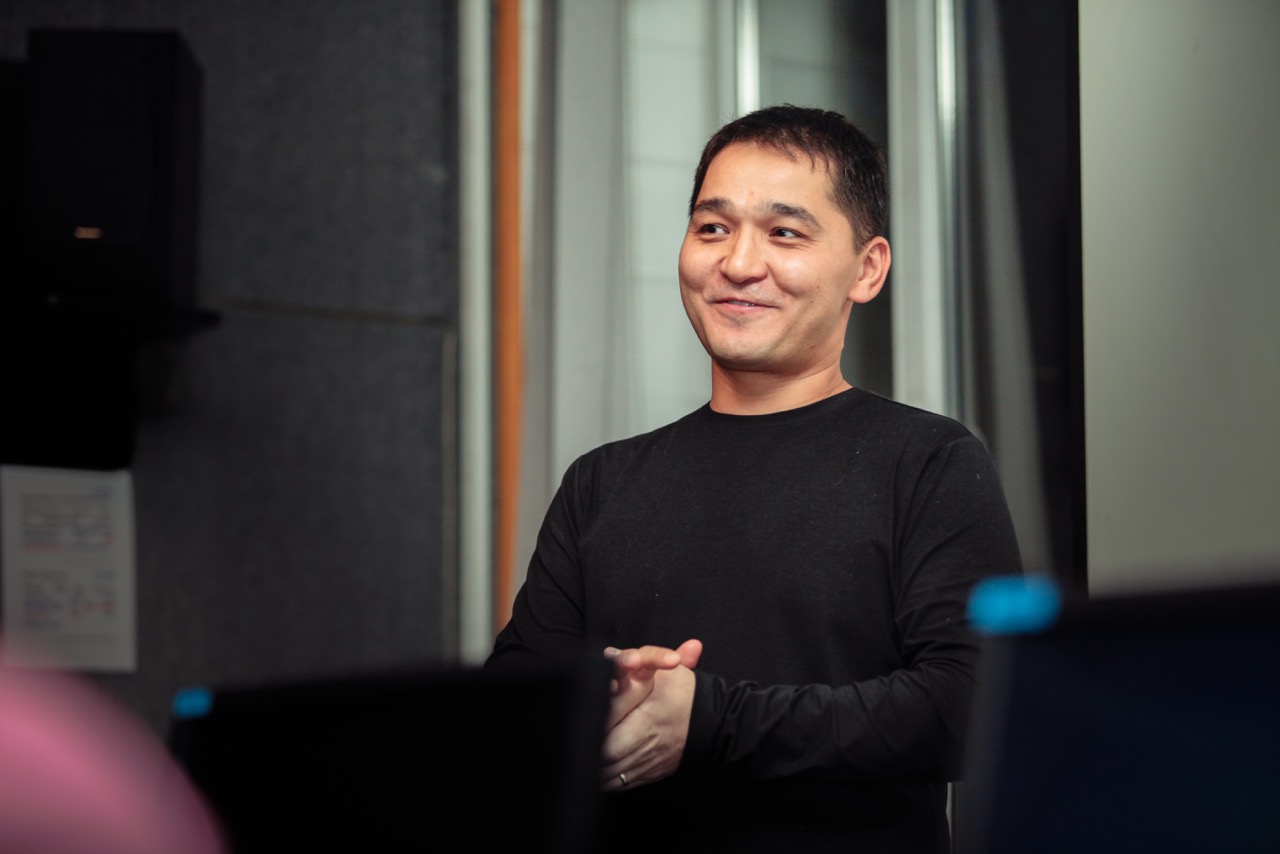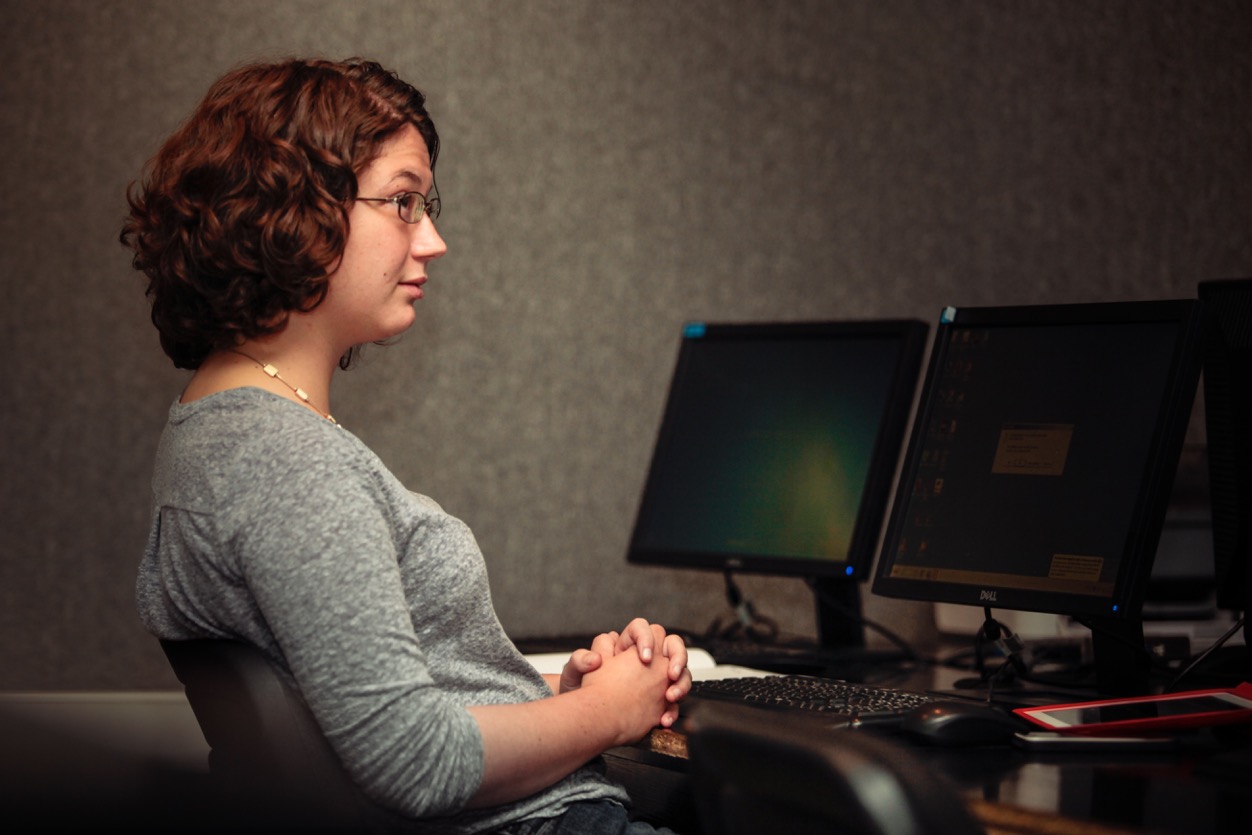Cash-Free & Connected: AUCA on the Cutting Edge
November 24, 2014
If a group of people were asked to imagine a university, there might be a few common components: a red brick wall veiled by ivy, a teacher in front of a blackboard, a quiet library full of students, those same students oblivious to the teacher while they play on their phones. Picture instead of Facebook on those students screens, a virtual classroom instead. And imagine that virtual classroom being accessible on nearly every device, which every student will have available to them, and with free Internet connectivity via AUCA throughout Bishkek: read on for more details of these decidedly exciting initiatives. In the modern field of education, technology is increasingly being incorporated into the physical classroom and beyond; and here at the American University of Central Asia both teachers and administration embrace and incorporate new mediums in every aspect of university life.
Future plans are foreshadowed by current practices, of which there are many. AUCA is now both a Cisco Network Academy and Microsoft IT Academy (and soon to feature an SAP Center of Excellence) through the auspices of AUCA’s recently launched IT Development Center. This gives the opportunity to AUCA students, faculty, and staff free of charge (as well as those outside the university, for a fee) to earn a certificate and prepare for a career and gain a foundation in IT that is becoming increasingly necessary in the modern world and workforce. The Cisco Network Academy will have its own laboratory in the new campus, known as AUCA-Ng (Next Generation), and is only a part of the plan to incorporate modern technologies more fully into AUCA life (see the recent news article on AUCA’s newly opened IT Development Center for more information on the Cisco Network Academy).
Dr. Kanybek Nur-tegin, a professor at Florida Atlantic University, is currently facilitating a Stanford online course on Game Theory through Coursera, an online-based teaching platform. He sat down and talked with us about the merits of the method and how the class works. “One of the problems that I’ve noticed was that in the Economist, there was an article about how high the dropout rate is for online courses...my goal is to lower the 95% rate to 40-50%,” he said. That is why he chose to facilitate and act as a sort of teacher, to guide the students if they have any questions; as the three teachers of the course are professors from Stanford and British Columbia and generally inaccessible to their students.
facilitating a Stanford online course on Game Theory through Coursera, an online-based teaching platform. He sat down and talked with us about the merits of the method and how the class works. “One of the problems that I’ve noticed was that in the Economist, there was an article about how high the dropout rate is for online courses...my goal is to lower the 95% rate to 40-50%,” he said. That is why he chose to facilitate and act as a sort of teacher, to guide the students if they have any questions; as the three teachers of the course are professors from Stanford and British Columbia and generally inaccessible to their students.
Some of the advantages he spoke of were more specific to Kyrgyzstan: “Not taking advantage of world class courses would be a mistake. Coursera introduced specialization certificates with courses…people here could bring their certificate to an employer, and their local school might not be up to par, but they could say ‘look, here is my certificate, I earned this myself’,” he said. Not only can that certificate serve as honestly earned added value to an existing degree but can also complement a degree to become more attractive to an employer, in areas of business or computer science for example. He recounted a story of a young student in Mongolia who received a perfect score in a course on electronics, who was then noticed and accepted by MIT (Massachusetts Institute of Technology) as an undergraduate, illustrating how transformative these online courses can be. And although the course will finish in just a few short weeks, Dr. Nur-tegin is interested in continuing to offer similar opportunities, and he is not alone.

Görkem Atsungur, an Assistant Professor in the European Studies department who has himself taken independent online courses in topics such as terrorism and democracy, has expressed interest in facilitating online classes in the future (and already uses them as supplementary material for his students). He also is one of the teachers who use Adobe Connect to create a virtual classroom on the students’ electronic devices, which allows him to “have a good substitute when busy with conferences or research,” which he said is also helpful for the students who might have to miss class for a similar reason.
A teacher in the Business Administration, Jean-Baptiste Jault, echoed his words; “I can share everything, like documents, presentations, and lectures. Everything is recorded so a student can watch everything later, and never miss anything.” One of Jean-Baptiste’s students, Jibek Batyrkanova, told us, “It can be hard to remember everything during a lecture…after the class you can go online and review everything.” One of the most interesting aspects is that it allows a student to take control of the presentation, and make his or her notes and answers on the electronic whiteboard for everyone to see, allowing students who might not usually actively participate a chance to become involved. When asked why he chose to incorporate Adobe Connect into his classes, Jean-Baptiste said it was recommended by someone who was always on the “cutting edge.”
That man on the cutting edge is AUCA’s Chief Information Officer and MBA Professor Dr. Zerhouni, who told us that his “idea is to create a virtual AUCA.” AUCA will begin a ‘Bring Your Own Device Policy’, which has a deceivingly straightforward and uninteresting name. But why the ‘device’ policy is so exciting is that after agreements with administration and lawyers, AUCA will be offering a subsidy plan so that all students will be properly equipped to engage in the new integrated technologies that AUCA is adopting. Dr. Zerhouni told us that students who meet certain numbers of criteria will be entitled to a roughly $300 USD stipend to buy a device. After signing an agreement, the student must then bring said device to university every day. With Adobe Connect and Citrix, the same desktop you see at an AUCA computer can be seen on any compatible device, bringing the entire student body to the same level of accessibility.
What brings that accessibility to an entirely new level will be the implementation of WiMAX (Worldwide Interoperability for Microwave Access) throughout the most highly trafficked areas of Bishkek. What this means is that there will be free Wi-Fi access to all those with an active AUCA user profile, including alumni, in nearly the entirety of Bishkek through strategically placed antennas. This means you can access the Internet, make phone calls, and anything you would normally do free of charge as long as an AUCA user profile is maintained.

And the cornerstone of all of these new initiatives is a multi - purpose RFID (Radio-frequency Identification) card. It will function as a banking card as well as identification with photo, and on the new campus (AUCA-Ng), can be used instead of cash. Instead of the current AUCA card, the new one will be able to create a 1:1 matching system of individual to identity card because of its value and built-in systems. Not only will it provide convenience and utility to students, staff, and faculty alike but will improve the security and cohesiveness of the new campus and of the entire AUCA community as well.
That is what all of these innovative solutions come together to create, a broader and yet more integrated and cohesive AUCA community. Having hosted Kyrgyzstan’s Technology Days, a global programming contest (ICPC), and a recent conference on Google all in the recent past and considering all of AUCA’s current and future initiatives; it is clear that AUCA is a pioneer in Central Asia for the betterment of both it’s own and the broader educational community.
